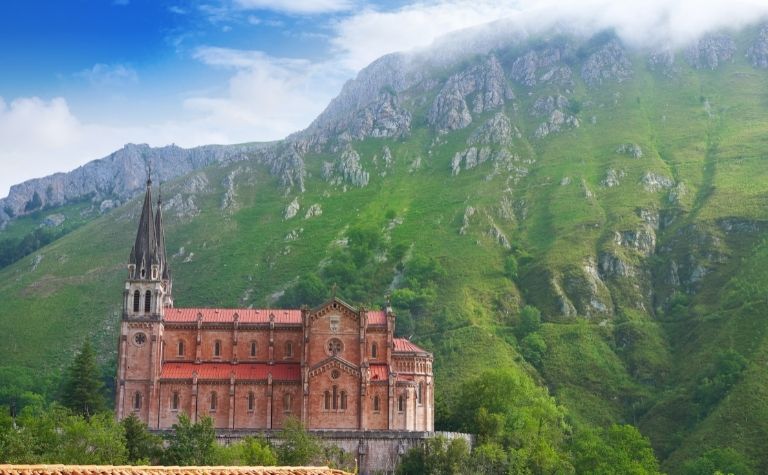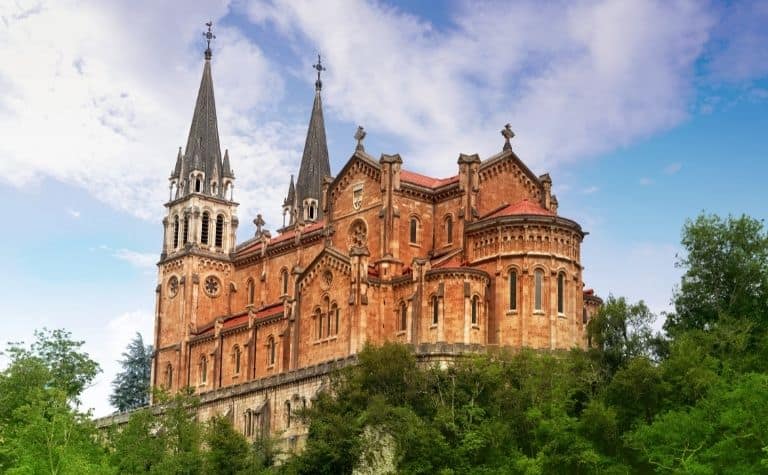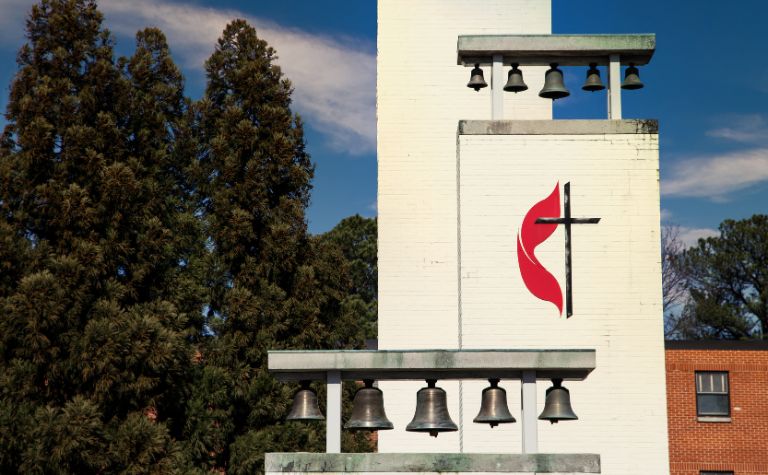The Methodist Church and the Roman Catholic Church both value doctrine and practice. Both traditions also believe they faithfully follow the teachings of Jesus of Nazareth, and they agree on doctrines like the Trinity, the inspiration of Scripture, and original sin. Yet there are important differences between Methodists and Catholics as well.
Methodism and Catholicism differ in their beliefs about whether the Bible is a Christian’s sole authority or if it shares authority with the Church and its officeholders. Methodism believes Scripture alone is authoritative, while Catholicism gives equal weight to tradition.
What do Methodism and Catholicism agree on? How significant are their disagreements, and what exactly are they on topics like God, the Bible, Christ, and the Church? Keep reading to learn more.
Also see Methodism vs. Presbyterianism: What’s the Difference? to learn more.

Methodism and Catholicism: Similarities and Differences
Prior to comparing viewpoints on individual doctrines and practices, it’s important to have a basic overview of Methodism and Catholicism, which the table below provides.
After reviewing this table, scroll below for more details about the similarities and differences between these two traditions. (Also see Methodist vs. Anglican: What’s the Difference?)
| Methodism | Catholicism |
|---|---|
| Name: The term “Methodist” was a nickname that observers gave to the founder of Methodism, John Wesley (1703-1791), and his friends at Oxford University. From the word “method” the name describes the strict discipline Wesley and other practiced. | Name: The word “Roman” is derived from the city of Rome, Italy. “Catholic” literally means “universal” or “global” or something similar. When “Catholic” is used in the context of “Roman Catholic,” it refers to the historic branch within the Christian religion. |
| Branch of Christianity: Methodism is a Protestant tradition born out of the Church of England. Many of the ideas it embraces are rooted in the Reformation, led by Martin Luther, Ulrich Zwingli, and John Calvin. | Branch of Christianity: Catholicism traces its origins to Christ and the Apostle Peter (Matt. 16:18-19), who the Catholic church believes was the first Bishop of Rome and Vicar of Christ on Earth. |
| Central commitments: As a Protestant denomination, Methodism subscribes to convictions of the Reformation: salvation is by grace alone, through faith alone, in Christ alone. The theology of Methodism is Arminianism. Leaders since Wesley have emphasized the importance of growing and maturing as a Christian. The tradition has always valued serving those in need as well. | Central commitments: The pope is the Vicar of Christ; Scripture and tradition are authoritative; justification involves forgiveness and sanctification; the sacraments are channels of God’s grace; Mass and the Eucharist are primary theological matters. |
Note: There isn’t a single Methodist denomination. It’s more accurate to speak of the “Methodist tradition,” comprising different denominations. The largest Methodists denominations are,
- The United Methodist Church (UMC): estimated 7.6 million members
- African Methodist Episcopal Church (AMEC): estimated 2.5 million members
- African Methodist Episcopal Zion Church (ECO): estimated 301,000 members
- Christian Methodist Episcopal Church (CMEC): estimated 290,000 members
Also see Catholic vs. Non-Denomination Churches: What’s the Difference? to learn more.

Methodist and Catholic Beliefs and Practices
Protestant Christianity, including the Methodist tradition, considers itself a truer or purer form of Christianity because Scripture is its authority.
Catholicism considers itself a truer and purer form of the faith because of (1) their commitment to Scripture, (2) they follow the Pope, who is the Vicar of Christ on Earth, and (3) they receive the Eucharist. (Also see Do Methodists Believe in the Saints?)
Methodists and Catholics have many similarities regarding theology, for example, the doctrine of God.
They generally agree about God’s nature as it relates to his person-hood and composition (e.g., the Trinity), his attributes (e.g., omnipotence, omniscience, and omnipresence), and his moral standards (e.g., humility is good, covetousness is bad).
Disagreements can be found in many areas as well. (Also see Do Methodists Pray to Mary?)
| Methodism | Catholicism |
|---|---|
| Human Leader: Methodism doesn’t have one human leader similar to the Pope. Methodism doesn’t recognize the Catholic Pope. It affirms that Christ is the head of the church. | Human Leader: Catholicism teaches that the Pope is the Vicar (i.e., representative or deputy) of Christ and the head of the Church on Earth, which is an office that finds its origin in the ministry of the Apostle Peter. |
| Saints: Like other Protestants, Methodists believe the New Testament uses the term “saints” to describe all believers, not a select few. Methodists honor believers no longer living on the Earth, but don’t venerate them or pray to them. | Ordinance/sacraments: Catholic teaching refers to these practices as “ordinances”: adult and infant baptism, confirmation, the Eucharist, penance, anointing, ordination, and marriage. These practices are channels of God’s grace, according to Catholic theology. |
| Infant baptism: Methodists practice “paedobaptism” (“paedo,” meaning “child”) by means of sprinkling or pouring. Baptism, which isn’t required for salvation, signifies inclusion into the covenant community. | Infant baptism: Catholicism practices paedobaptism, too. Children of Catholic parents are baptized to cleanse them of original sin and regenerate them. |
| The Lord’s Supper: Methodists believe Christ is present in the bread and the cup, but they don’t believe that the elements literally become the body and blood of Christ. | The Lord’s Supper: Also called “the Eucharist,” it is a memorial in which the elements of the bread and cup become the body and blood of Christ (i.e. “transubstantiation”). |
| Saints: Like other Protestants, Methodists believe the New Testament uses the term “saints” to describe all believers, not a select few. Methodists honor believers no longer living on the Earth but don’t venerate or pray to them. | Saints: In Catholic teaching, believers who have lived with great virtue and honor may be considered for canonization after physical death. Believers still living on Earth venerate the saints, in part by asking them for prayer and blessings. |
| Mary: Catholicism teaches that Mary referred to as “the Mother of God,” was virgin born, lived a sinless life, reversed Eve’s disobedience, was a perpetual virgin, was raptured to heaven, and is an advocate and co-mediator. | Mary: Catholicism teaches that Mary, referred to as “the Mother of God,” was virgin born, lived a sinless life, reversed Eve’s disobedience, was a perpetual virgin, was raptured to heaven, and is an advocate and co-mediator. |
| Religious orders: Methodists pastors are mostly referred to as pastors or ministers. They can marry. Women can be ordained as clergy in the Methodist tradition. | Religious orders: The term describes men (e.g., priests) and women (e.g., nuns) who have fully devoted themselves to a certain form of religious life, which includes poverty, chastity, and obedience. |
Also see Catholic vs. Assemblies of God: What’s the Difference? to learn more.

The Relationship Between Methodists and Catholics
Respect generally characterizes the relationship between Methodists and Catholics. However, the leaders in each tradition and many of their devoted members take their doctrine and practice seriously.
- Practicing Methodists are devoted to the teachings of John Wesley, his passion for evangelism and discipleship, and serving the poor and marginalized in society. (Also see Do Methodists Pray the Rosary?)
- Practicing Catholics are devoted to the Eucharist and will vigorously defend it, in contrast to Methodist beliefs about the Lord’s Supper.
A Methodist minister or church member is kind and loving to Catholics (though there may be a few unfortunate exceptions) but be dogmatic about the difference in their beliefs.
A Catholic may similarly interact with a Methodist (again, with perhaps a few exceptions). (Also see Do Methodists Celebrate Lent?)
Do Catholics believe Methodists are Christians? Some Catholics believe the differences they have with Methodists render Methodists unbelievers.
Other Catholics believe that many Methodists are Christians but live out their faith apart from the true church.
Do Methodists believe Catholics are Christians? Some Methodists believe the differences they have with Catholicism render Catholic unbelievers.
Other Methodists believe that many Catholics are Christians, but their faith contains unbiblical traditions.
Also see What Do Methodists Believe? to learn more.
Please see the related articles below.
References:
[1] Source
[2] Source
[3] Source
Related Articles
Catholic vs. Protestant vs. Orthodox: What's the Difference?
Roman Catholicism, Protestant Christianity, and the Eastern Orthodox Church are the three historical branches of the Christian religion. Each tradition traces its doctrines and practices to the New...
Pentecostalism vs. Charismatic Movement: What's the Difference?
Many people know that the terms "Pentecostal" and "charismatic" are associated with certain beliefs, churches, and people in modern Christianity but aren't sure how they compare. Although the terms...
